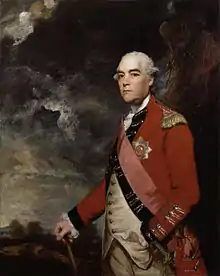Sir William Fawcett | |
|---|---|
 General Sir William Fawcett | |
| Born | 1727 |
| Died | 1804 |
| Allegiance | |
| Service/ | |
| Rank | General |
| Battles/wars | Seven Years' War American Revolutionary War |
| Awards | Knight Companion of the Order of the Bath |
General Sir William Fawcett KB (1727 – 1804) was a British Army officer who served as Adjutant-General to the Forces from 1781 to 1799.
Military career
Educated at Bury Grammar School in Lancashire,[1] William Fawcett was commissioned into the 33rd Foot in 1748.[2]
In 1758 he was despatched to the War in Germany where he became an Aide-de-Camp to the Marquess of Granby.[2] Then in 1775 he was sent to Hannover, Hesse-Cassel, Hesse-Hanau and Hanover to recruit troops for the War in America.[2] The majority of the German troops who fought on the British side in the conflict were known as the "Hessians" in reference to the place of origin.[3]
He was appointed Adjutant-General to the Forces in 1781: in this role he was involved in introducing Regulations for the Heavy Infantry and then for the Cavalry.[2]
In retirement he served as Governor of the Royal Hospital Chelsea from 1796[2] until 1804.[4]
Family
In 1749 he married Susannah Brook and together they had eight children. Following her death on 7 April 1783 he married Charlotte Stinton (d. 1805): they had no children.[2]
See also
References
- ↑ Fallows, I.B. "Bury Grammar School A History c.1570 to 1976", The Estate Governors of Bury Grammar School, Bury, 2001
- 1 2 3 4 5 6 Sir William Fawcett at Oxford Dictionary of National Biography
- ↑ Atwood, Rodney (1980). The Hessians: Mercenaries from Hessen-Kassel in the American Revolution. Cambridge, England: Cambridge University Press.
- ↑ The Halifax lad who was Byron's hero! Halifax Courier, 25 March 2009
- ↑ Survey of London, Volume 10 British History on Line